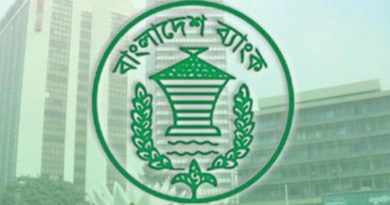3 banks inform Bangladesh Bank of stocks special fund formation
Three banks on Sunday informed the Bangladesh Bank that they had formed special funds for the stock market as part of a central bank move to form such funds to support the ailing market.
Bangladesh Bank officials said that United Commercial Bank, Shahjalal Islami Bank and state-owned Sonali Bank had informed the central bank on the day that they had set up the special fund.
The banks set up a special fund worth Tk 200 crore each, taking the combined size of the special funds meant for the capital market to Tk 600 crore, the BB officials said.
All three banks have formed the special fund with their own money.
Confirming the special fund formation, UCB company secretary ATM Tahmiduzzaman said, ‘We have set up the fund recently for investment in stocks in line with the BB circular that allowed us to do so.’
Apart from the three banks, several other banks, including Dhaka Bank, Rupali Bank, Agrani Bank, Janata Bank and The City Bank were undergoing the process to set up the special fund.
The City Bank has already renewed Tk 50 crore in REPO facility, previously taken for the purpose of investment on the stock market.
Instigated by the prolonged turmoil in the country’s capital market that dragged down the key index of the Dhaka Stock Exchange, DSEX, to 4,036.24 points on January 14 this year, the central bank on February 10 declared a low-cost cash support to the banks to inject funds into the capital market.
Under the BB’s low-cost cash facility for stocks, each bank is allowed to form a Tk 200-crore special fund by borrowing money at 5 per cent interest from the central bank.
The circular said that the fund would be valid till February 2025 and the banks would be allowed to take the money under the scope till January 13, 2025.
Prior to the decision, the core index of the Dhaka Stock Exchange lost over 1,900 points in 11 consecutive months, which became a major headache for the government.
Based on media reports on the BB move to offer low-cost funds, the market started to recover even before the announcement was made by the BB with the DSEX reaching 4,758 points on February 19.
However, the upward market trend did not last long with investors’ enthusiasm fading as the banks delayed to set up the special funds.
Investors’ enthusiasm turned into panic when the central bank on February 24 fixed the ceiling of the lending rate for banks at 9 per cent.
In fear that the banks’ earnings would fall, the capital market investors went for heavy sale of banking shares, resulting in around a 300-point fall in the DSEX.
The investors, who had been jittery since the outbreak of the coronavirus epidemic that has already spread to over 100 countries, went for panic sales on Monday when the government on Sunday reported the first three coronavirus cases in the country.
As panic gripped investors, the DSEX witnessed a plunge of 6.51 per cent, or 279.32 points, to close at 4,008.05 points on the day.
Monday’s mayhem marked the biggest crash in DSEX history, which wiped out 17,291.38 crore in market capitalisation in a day.
The index on Monday surpassed the six-year low suffered by the market on November 3, 2013 when the index was at 3,993.33 points. (Source: New Age)


